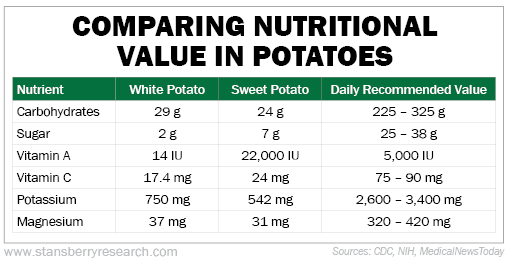People love their spuds.
So much so that we received an e-mail about one of our latest issues, in which we warned against eating too much of the starchy white vegetable:
I can't believe that potatoes have been added to your "white killers" list of white rice, white sugar, and white bread. Ugghh! I LOVE potatoes (they are arguably my favorite food) and have eaten them my entire life. It will be EXTREMELY difficult for me to give them up.
On a related note, are sweet potatoes okay to eat? I HATE their taste, but they are orange and not white. – J.K.
J.K. isn't alone in his love of potatoes. The potato is one of the most-consumed foods in the world. Here in the U.S., we each eat about 117 pounds of potato every year.
Fortunately, you don't have to completely give up your beloved potatoes, but you do need to understand the pros and cons...
Russet potatoes are a great source of fiber and potassium. They contain about 750 mg of potassium... or about 20% of your recommended daily intake.
But sweet potatoes pack even more nutrients. They contain plenty of vitamin A, which we need for eye health and strong immune systems. Take a look at how these two potatoes stack up, comparing single, medium-sized, skin-on spuds (the nutritionists used white potatoes and Russets interchangeably – consider this the large, typical Russet potato):

Although sweet potatoes have lower levels of potassium and magnesium, they also contain 43 mg of calcium, which is about 3.5% of your daily recommended intake.
However, we have warned you that if you're taking a certain type of medication, you should stay away from white potatoes...
If you're one of the 168 million Americans taking a popular blood-pressure medicine called an ACE inhibitor (that's angiotensin-converting enzyme), you might want to reconsider eating white potatoes.
You may remember we recommended white potatoes as a great source of potassium. However, ACE inhibitors cause the body to retain potassium instead of filtering it out through the kidneys. That's why kidney disease also results in potassium buildup. Too much potassium leads to a condition called hyperkalemia, which causes symptoms ranging from muscle weakness to dangerous, irregular heartbeats.
Popular ACE medications include Lotensin, Capoten, and Vasotec. If you're taking one, make sure your doctor monitors your potassium level regularly. If it's high, cut out the potatoes.
But the real problem with potatoes involves blood sugar.
The glycemic index (GI) is a scale that measures how much the carbs in a certain food increase your blood sugar. Glucose itself ranks at 100. Foods high on the index spike your blood sugar. That's dangerous over time, particularly for folks with diabetes.
A baked Russet potato has a GI of 111. That's one of the highest-rated foods possible. In fact, in a study from the journal Diabetes Care, researchers calculated the glycemic indexes of more than 1,000 foods... and Russet potatoes had one of the highest numbers in the entire list.
A baked sweet potato, on the other hand, only has a GI of 70. That's still higher than some other vegetables (parsnips, for instance, are 52). But it's much lower than the Russet.
Now, I know what you're thinking... we've previously discussed the problems with solely using a GI measurement.
Glycemic load (GL) is a better measure of what your body actually does. That's because GL measures how much your blood sugar rises based on serving size.
It involves multiplying the GI by the number of carbs in a serving, then dividing by 100. So while that Russet potato has a GL of 33, a sweet potato has a GL of 22. Anything with a GL over 20 or over is considered high, but even here, sweets beat out the Russet.
When I'm eating potatoes, I avoid the Russets and go for either sweet potatoes or purple/blue potatoes.
Purple potatoes contain an antioxidant known as anthocyanin that can lower inflammation, reducing your risk of heart disease and cancer. Many big chain stores don't carry purple potatoes. But you can find them at Whole Foods or gourmet-food stores.
Whatever you do, don't fry them up too often. In 2017, Researchers from the U.K.'s Food Standards Agency confirmed that cooking starchy foods like potatoes at high heat leads to the formation of a chemical called acrylamide. The "crispier" the potatoes, the higher the amount of acrylamide. Frying produced the highest amount of the chemical.
Research suggests acrylamide leads to certain cancers. Now, we know that it takes a lot of acrylamide to do damage (remember our California coffee cops)... but with all the trans fat that triggers inflammation, we're happy to throw our potatoes on the grill instead.
So don't worry, J.K. You can still enjoy potatoes, particularly if you need a good source of potassium. But limit your consumption, particularly if you have blood sugar control issues. And maybe give sweet potatoes a chance – my researcher likes them with just a little butter and cinnamon. And I like to grill up purple potatoes sliced (like a chip), brushed with a little olive oil, and sprinkled with fresh rosemary.
What We're Reading...
- Something different: Print-your-own electronics might be here.
Here's to our health, wealth, and a great retirement,
Dr. David Eifrig and the Health & Wealth Bulletin Research Team
July 23, 2019
